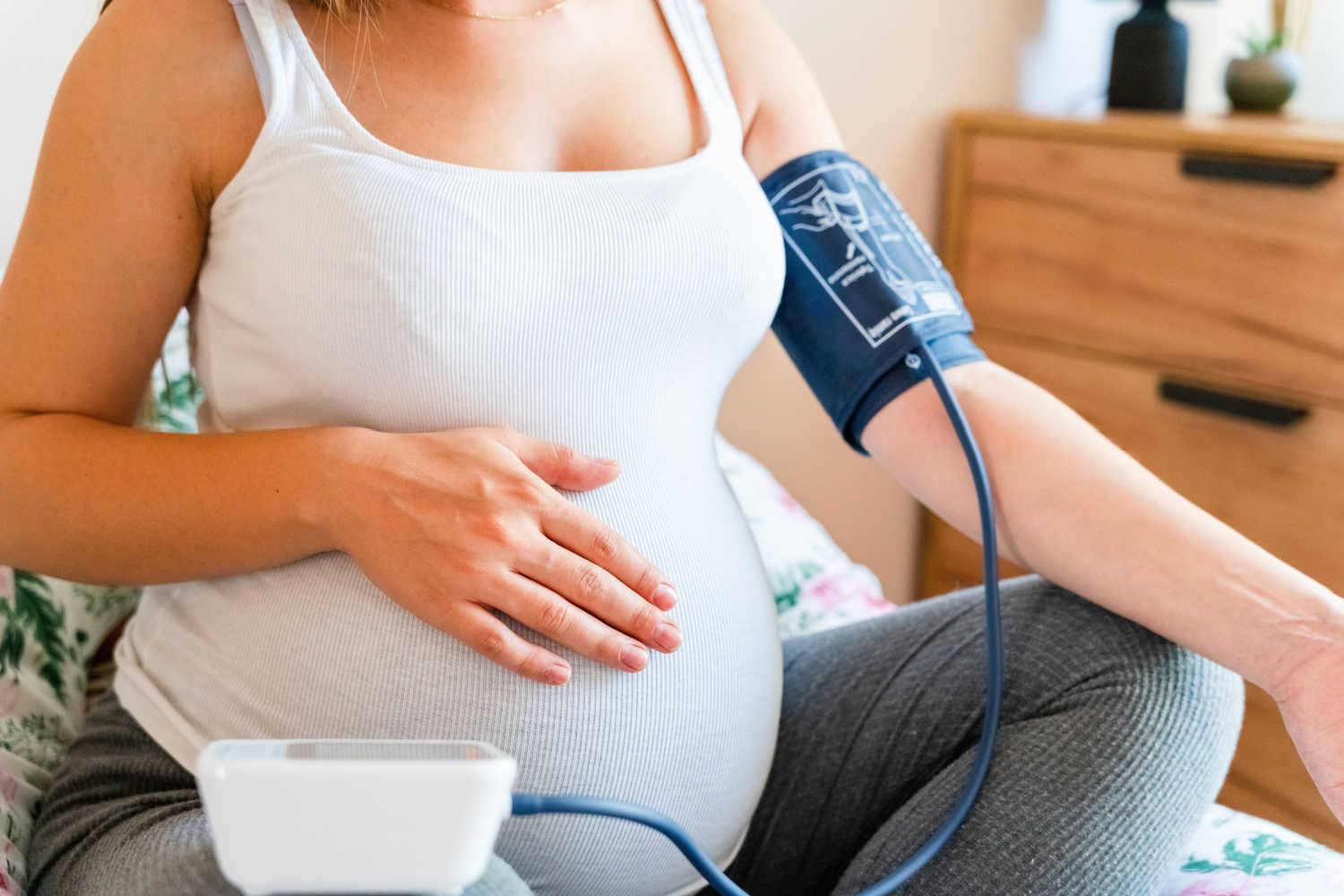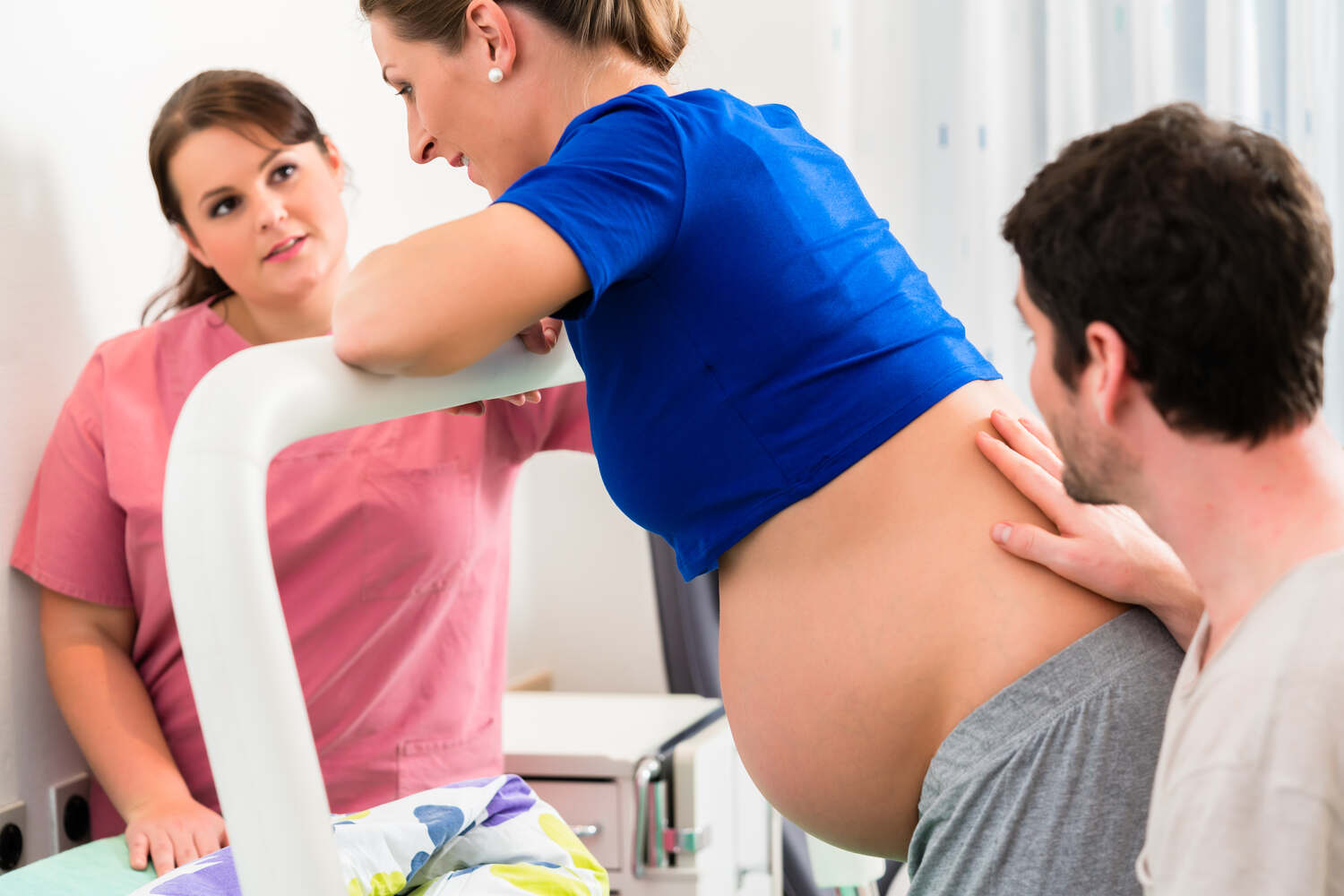
Pregnancy-Induced Hypertension-Causes, Signs, And Treatment
8 min readWritten by Editorial Team


Pregnancy is the most crucial phase in a woman’s life and is also the time when she undergoes a lot of physical, emotional, and hormonal changes. There are several means to restore the hormonal balance after delivery, though. No wonder they say,” A woman is complete when she becomes a mother.” This is a transforming phase in a woman’s life where she has no idea about the cause of these changes. Not only that, the changes are not common for all; some find a smooth way out for delivery while for others, it poses tough challenges like pregnancy-induced hypertension.
Since the body and the hormones play topsy-turvy in these nine months, the sugar levels and the blood pressure, etc. Are bound to be affected. Stress is another common factor that can lead to complications. One such common problem is that of high blood pressure levels, aka, Pregnancy Induced Hypertension or Gestational Hypertension in medical terms, a situation where the blood in the blood vessels travels far above the normal pressure.
In This Article
- Different Forms Of High Blood Pressure During Pregnancy
- What Is Pregnancy-Induced Hypertension?
- What Are The Causes And Risks Of PIH?
- What Are The Symptoms Of Pregnancy-Induced Hypertension?
- Risks Of PIH To The Mother And The Baby
- Diagnosis Of Pregnancy-Induced Hypertension
- What Are The Treatment Options For Pregnancy-Induced Hypertension?
- Prevention Of PIH
- FAQ’s
Different Forms Of High Blood Pressure During Pregnancy
The pressure of the blood flow in the blood vessels can be seen rising under varied circumstances during the phase of pregnancy. This difference could be with respect to the acuteness and the effect it can have on the body of the pregnant lady. Some of the different forms of hypertension that can be seen in pregnancy are as follows:
- Chronic Hypertension: This is characterized by elevated blood pressure levels that can happen before 20 weeks or even before conceiving and can also last post-delivery. This can only be detected on the first prenatal visit to the doctor, and not many are aware of this until the doctor diagnoses the same.
- Gestational Hypertension: This refers to the elevated blood pressure levels that are manifested post20 weeks of pregnancy. Here the blood pressure will fall back to normal after the delivery. There will be no significant symptoms that appear in relation to this.
- Preeclampsia: Both the forms of high blood pressure mentioned above, if not cured or treated at the appropriate time, could result in a situation also referred to as Preeclampsia. This could lead to protein elements being detected when the urine is tested. It can even lead to further complexities for the mother-baby duo.
What Is Pregnancy-Induced Hypertension?

Pregnancy-induced hypertension, which is also referred to as (PIH), can even be termed as gestational hypertension, which is not treated or cured at the appropriate time, could result in toxemia, also known as preeclampsia. This generally happens post 20 weeks and can be characterized by the following symptoms, and they are as follows:
- The blood pressure goes beyond 140/90 mm Hg.
- The presence of protein was detected by a urine test.
- Swelling in body
- All symptoms become normal within six months from delivery.
Any expecting woman can contract PIH. However, certain risk factors increase the chances of getting it.
What Are The Causes And Risks Of PIH?
Pregnancy-induced hypertension or PIH is a common situation faced by many pregnant women. This can take place with any pregnant lady, but there are a few signs which can make it a risky one, and some of them are as below:
- Common for women who are pregnant for the first time.
- This condition has existed in the family history.
- The occurrence of multiple pregnancies or twin babies
- The woman is either younger than 20 years or more than 40 years.
- In case a kidney ailment or hypertension has been detected before pregnancy.
- Occurrence of diabetes
In case any woman has been observing or manifesting these symptoms or experiencing blood pressure fluctuations, which is an indication for gestational hypertension.
What Are The Symptoms Of Pregnancy-Induced Hypertension?

We have already studied the causes or the factors that could lead to PIH or pregnancy-induced hypertension. When a woman becomes pregnant, it is not easy for her to detect what she is going through as there are too many changes happening with her physically, emotionally and it is not easy for her to combat it as well, so one needs to have patience and understand and deal with the pregnant women and keep her happy. It is also important to understand the symptoms that indicate gestational hypertension or PIH. Some of these are given as under:
- The systolic or increased blood pressure reading levels higher than 140.
- The diastolic or the decreased blood pressure reading levels higher than 90
- Unexpected weight gain
- Prominent changes like blurry or unclear vision.
- Stomach pain or pain in the abdomen
- Persistent headaches
- Sweating of palms and soles excessively
- Nausea or giddiness
- Hearing troubles
- Increased heart rate
- Lethargy or sleepiness
It is very important to get the blood pressure levels checked at all check-ups at all visits as high blood pressure levels could be dangerous for both the mother and the unborn child.
Risks Of PIH To The Mother And The Baby
The increased levels of blood pressure are not only harmful to the mother and baby but also pose a threat to the endurance of the blood vessels and can stop the blood flow to different body parts like the brain, kidney, placenta, liver, and the uterus.
Under a situation where the blood flow is not enough for the placenta, the fetus gets affected as it gets less food and oxygen, resulting in inappropriate birth weight and other developmental issues.
Apart from this, other risks that are posed to the mother and the baby are given as under:
- High blood pressure levels are associated with convulsions.
- Premature detaching process of the placenta
- Poor growth of the fetus
- Stillbirth issues
- Delivery before time
This situation can be monitored or diagnosed if regular or pre-natal check-ups are done on time, helping to not worsen the situation.
Diagnosis Of Pregnancy-Induced Hypertension

Blood pressure is very important for any surgery, operation, or procedure to be done, so the doctor always makes it a point to check on every visit. The impact of high blood pressure levels can be very harmful and can even indicate pregnancy-induced hypertension. In a situation where the blood pressure has been found to be high in successive and regular follow-ups, the doctor can suggest a urine test as well to find the presence of protein traces.
While on a doctor’s visit, the blood pressure levels are calculated with the weight gain and the presence of protein by a urine test. If even after these tests, one still feels excessively fatigued or shows more signs of gestational hypertension, the doctor can recommend more tests like the following:
- Detection of Edema or water retention in the tissues.
- Eye test to detect changes in the retina
- Tests for detecting blood clots
- Tests to administer the proper functioning of the liver and the kidneys.
After these tests, in case the gestational hypertension is conformed or even speculated, a non-stress test is conducted further to scrutinize the growth of the baby. This test is done with the help of an ultrasound transducer that helps in recording the heart rate of the baby. It even makes use of a to co-transducer to observe and even document the activity happening in the uterus.
In case the baby is healthy and active, the heart rate will be high and will indicate that all is well inside the womb. In other words, the diagnosis of these tests determines the healthy growth and development of the mother and the baby.
What Are The Treatment Options For Pregnancy-Induced Hypertension?

Till now, we have studied the causes, symptoms, and the process of diagnosing it. Pregnancy-induced hypertension is a common occurrence in pregnant women. When it comes to the treatment options for PIT, well, it depends on several factors:
- The stage of the pregnancy that the pregnant woman is
- Her medical history and the complete health
- The severity of the situation
- The tolerance level to the medicines, therapies as well as practices.
- Your pregnancy stage, medical history, and overall health
The focus of the treatment procedure is the prevention of any situation from becoming acute or serious, leading to complexities. Thus, a permutation of different treatment choices is recommended, like:
- Complete bed rest at home or in the hospital
- A close check of the blood pressure levels.
- Close monitoring of the fetus by the following procedures-
- Monitoring the frequency of the kicks and the baby’s movement, in case there is an abrupt change, indicates the baby is under stress.
- The non-stress test can gauge the heart rate of the baby with respect to the movement of the baby
- Doppler test uses sound waves as a medium to calculate and assess the blood circulation in the fetus.
- Regular urine, as well as blood tests to assess any unexpected changes
- The test for speeding up the lung growth of the baby
- Delivery as the last choice if no other treatments work, and it is very risky or fatal for the mother and the baby.
Treatment is a way to get cured and monitored, yet at the same time, one can resort to taking care of their self that can help to control hypertension, and needs less treatment or no treatment at all. Some of the self-care measures are:
- Take ample rest and sleep on the left side as it alleviates the pressure from the main blood vessels and organs. It is an excellent way also to get an ample amount of nutrients as well as blood being transported to the baby.
- Less consumption of salt.
- Keep one hydrated
- Never miss the follow-ups
There is no one that has been detected for pregnancy-induced hypertension, so there is a multitude of them, and this situation cannot be prevented totally, but a few factors can be limited or controlled.
Prevention Of PIH
As stated earlier, there is no major cause for the occurrence of gestational hypertension. So preventing it is not a possibility, but one can try to follow a few measures which can keep it in control and not make it worse, few simple measures that can be followed by self are as under:
- Increase the consumption of water to ten glasses daily
- The protein intake should be increased
- Junk should be a complete no
- One should practice exercises that have a low impact after getting a green signal from the doctor.
- Always keep the feet a little elevated by keeping a pillow under the feet as this increases the blood circulation to the other parts of the body
- Always opt for a healthy diet
- Ensure that the weight gain is stable.
- Reduce the consumption of caffeine
- Get your blood pressure levels checked regularly.
Thus, it can be said that PIH is not a state to worry about and is not acute if diagnosed at the right time. The ideal way is to get it checked at all follow-ups throughout pregnancy. The mantra is to get regular checkups, maintain a healthy lifestyle, and keep oneself active. Also, it is also important to keep a check on all the symptoms concerning hypertension and consult a doctor if there is anything strange noticed or if the need be.
FAQ’s
What Is Normal BP Range In Pregnancy?
In pregnancy, a normal blood pressure reading is less than 120/80 mm Hg, the same as it is for persons who are not pregnant.
What Is The BP Range For Gestational Hypertension?
Blood pressure readings over 140/90 mm Hg after 20 weeks of pregnancy are indicative of gestational hypertension in the absence of additional organ abnormalities.
Can Lack of Sleep Cause High Blood Pressure?
Lack of sleep has been linked to a rise in blood pressure. Those with sleep durations of six hours or fewer may be at greater risk for hypertension episodes. Sleep disturbances have been linked to an increase in blood pressure in those who already suffer from hypertension.
Is Normal Delivery Possible With Gestational Hypertension?
When high blood pressure is detected early in pregnancy, the majority of women will have problems less delivery. If you have high blood pressure and give birth vaginally, your labor will almost certainly be induced. You should be able to have a normal vaginal delivery as long as your blood pressure is under control.

Editorial Team,
With a rich experience in pregnancy and parenting, our team of experts create insightful, well-curated, and easy-to-read content for our to-be-parents and parents at all stages of parenting.Read more.
Responses (0)
Want curated content sharply tailored for your exact stage of parenting?
Related articles

Samosa During Pregnancy – Is It Safe to Eat?

Numbness During Pregnancy – Causes And Tips To Deal

Top Modern 500 Baby Girl Names Starting With P

Nipple Stimulation to Induce Labor – How Does it Work and Tips to Perform

6 Different Types of Delivery Methods You Must Know

Bio Oil During Pregnancy – Is it safe?
Sponsored content
Discover great local businesses around you for your kids.
Get regular updates, great recommendations and other right stuff at the right time.





